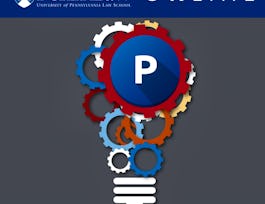Far too often, researchers are misinformed about the role and the possibilities arising around patents and Intellectual Property Rights (IPR). In this course we will teach you what IPR are - with a special focus on patents. Also this course will look at the importance of patents in the world of biotechnology - and what you actually can patent.



(218 reviews)
Details to know

Add to your LinkedIn profile
14 assignments
See how employees at top companies are mastering in-demand skills


Earn a career certificate
Add this credential to your LinkedIn profile, resume, or CV
Share it on social media and in your performance review

There are 9 modules in this course
An introduction to the important subjects within the field of patenting, such as novelty and “person skilled in the art”. By Federico De Masi
What's included
5 videos1 reading1 assignment1 peer review
Get to know the important timeline for getting a patent. We look at the filing, international filing, examination, publication, and potential approval of a patent. Note that we will go deeper into the search machinery later in lecture 5. By Peter Ulvskov.
What's included
2 videos2 readings2 assignments1 peer review
The first video introduces search reports and looks into destruction of novelty/inventive steps. The second video covers international filling - the PCT system. The issues with medical use claims will also be discussed. By Peter Ulvskov.
What's included
2 videos2 readings3 assignments1 peer review
To map the patent landscape for an invention you need to be able to perform “literature search” for patents. This is important if you want to avoid infringing existing patents. In this lecture, different databases are reviewed: Derwent, USPTO, and NCBI. By Peter Ulvskov.
What's included
3 videos1 reading4 assignments1 peer review
Here we go through the interesting issues, rules and possibilities of patenting specific biotechnology related items as microorganisms or enzymes. By Claus Jørgensen.
What's included
1 video2 readings1 assignment1 peer review
How can we avoid infringing other patents and what are solutions in case we do? Freedom to operate (FTO) is in its essence to the constraints surrounding your invention that prevents your ability to produce/sell your invention. By Karin Beukel.
What's included
1 video1 assignment1 peer review
In this lecture the novelty of chemical molecules and natural products are discussed. An interesting real life example tried to but things in perspective. By Federico De Masi.
What's included
2 videos1 reading1 assignment
Introduction to using SciFinder, an enormous database for chemical reactions and compounds. See how one utilizes Markus formulas to search for patents. By Peter Ulvskov.
What's included
1 video1 peer review
Philosophical lecture about the benefit of patenting and how to actually use your approved patent. Also importantly, we cover ALL the reasons to NOT patent! Definitely important even though we really love patents in this course.
What's included
3 videos1 reading1 assignment
Instructors



Recommended if you're interested in Basic Science

Yale University

University of Pennsylvania

University of Geneva

University of California San Diego
Why people choose Coursera for their career




Learner reviews
Showing 3 of 218
218 reviews
- 5 stars
72.93%
- 4 stars
17.43%
- 3 stars
5.96%
- 2 stars
1.37%
- 1 star
2.29%
New to Basic Science? Start here.

Open new doors with Coursera Plus
Unlimited access to 7,000+ world-class courses, hands-on projects, and job-ready certificate programs - all included in your subscription
Advance your career with an online degree
Earn a degree from world-class universities - 100% online
Join over 3,400 global companies that choose Coursera for Business
Upskill your employees to excel in the digital economy
Frequently asked questions
Try to open in another web browser.
Access to lectures and assignments depends on your type of enrollment. If you take a course in audit mode, you will be able to see most course materials for free. To access graded assignments and to earn a Certificate, you will need to purchase the Certificate experience, during or after your audit. If you don't see the audit option:
The course may not offer an audit option. You can try a Free Trial instead, or apply for Financial Aid.
The course may offer 'Full Course, No Certificate' instead. This option lets you see all course materials, submit required assessments, and get a final grade. This also means that you will not be able to purchase a Certificate experience.
When you purchase a Certificate you get access to all course materials, including graded assignments. Upon completing the course, your electronic Certificate will be added to your Accomplishments page - from there, you can print your Certificate or add it to your LinkedIn profile. If you only want to read and view the course content, you can audit the course for free.






